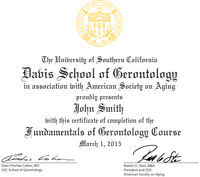Interested in learning about the top online gerontology course?
As humans continue to live longer, the aging population creates a demand for educated health professionals who are competent enough to handle the complicated life and family challenges of the aging population with the needed compassion. Available data indicates that about one in eight Americans is 65 or older. The statistics are even much higher in Japan where 33.0% of the population is above the age of 60 and persons aged 65 and above constitute a fifth of the total population and projected to reach a third by the year 2050.
The picture is similar in most parts of the world and this global trend has created a demand for professionals trained to understand the unique needs of older adults. A Certificate in gerontology or geriatrics provides the skills and specialized knowledge to help improve the quality of life for older adults. The online certificate in gerontology is ideal for professionals currently working with older adults who desire to gain specialized knowledge, skills, and a solid understanding of the age-related social, physical, and emotional issues facing older adults in this very distinct and expanding profession. Online gerontology certificate programs are uniquely designed to deliver these skills and knowledge using a virtual platform. The best online gerontology certificate programs are:
- Fundamentals of Gerontology by The University of Southern California & ASA
This online gerontology certificate program is offered in the Leonard Davis School of Gerontology of the University of Southern California in collaboration with the American Society on Aging. This program is exclusive to only members of the American Society of Ageing (individual Professional Members), non-members who intend to participate in the course must first register as members of the society. Upon completion of the program, a certificate of completion from USC is issued to the participants.
Cost of Gerontology Program: $ 500
Cost of ASA Membership: $ 255
In addition, USC also offers a Graduate Certificate in Gerontology course to a wider audience through the Leonard Davis School of Gerontology. This program is designed for students who currently have a bachelor’s degree in a different discipline or experience in another profession who intend to obtain a greater understanding of the concepts and theories in gerontology.
- Frank J. Manning Certificate in Gerontology online by The University of Massachusetts Boston
Designated as a program of Merit by the Association for Gerontology in Higher Education (AGHE), the Frank J. Manning Certificate in Gerontology has trained students to cope with the challenges of gerontology for almost 4 decades.
The program has also equipped many professionals with the needed skills and resources to excel in gerontology. In addition, the program is an approved CEU credit course by the Massachusetts Board of Registration for Nursing Home Administrators and is closely aligned with the Gerontology Institute and the College of Public and Community Service.
Curriculum Highlights
- Understand trends affecting the quality of life for aging populations.
- Utilize the existing network of major health and social welfare programs and services available for the aged.
- Advocate effectively and influence the decision-makers.
- Act as administrators in the planning and delivery of health and social services of older people.
- Perform friendly visitations to frail older adults in order to examine the role of an effective helper and the structure of purposeful relationships.
- Hone your research skills and, make a difference.
The other gerontology certificate program offered by the University of Massachusetts is the Adult/Gerontology and Family Nurse Practitioner (NP) Post Master’s, Certificate program. This online course is a 12- or 21-credit certificate program designed to equip Registered Nurses who have a Master’s degree in nursing to acquire the knowledge and clinical experience that will equip them to sit for national certification exams so as to qualify as gerontology, adult, or family nurse practitioners.
Application Cost: None
- Online certificate in Gerontology By Indiana University Bloomington
The graduate certificate in gerontology and health Of Indiana University is offered through its School of Public Health. The program is designed for current graduate students and individuals already working in fields related to gerontology.
The program requires 12 credits: three courses one of which is mandatory and a practicum. Application for this program is in two parts: the professional and online graduate admission part and the other through the University’s School of Public Health Application. Only one application fee is required for both.
- Online certificate in Gerontology by the University of Missouri
The University of Missouri online graduate certificate in gerontology is a 21-credit program consisting of five compulsory courses and two electives. Although no Graduate Record Examination (GRE) scores are required for this program.
Applicants are expected to hold a bachelor’s degree with at least a 3.0 GPA in upper-level. Courses have specific beginning and end dates and are semester-based. Most courses are taught asynchronously, but some include synchronous class discussions.
- The Graduate Certificate in Gerontology of the University of Pittsburgh
This online gerontology course is designed to serve professionals in a wide variety of disciplines who are interested in improving their basic knowledge of gerontology and geriatrics.
A minimum of 16 credits is required to earn the Graduate Certificate in Gerontology of the university, this includes the compulsory core curricula of the program which consist of about 6–7 credits with the remaining three or more courses (8 or 9 credits) selected from a prescribed pool of elective courses.
An applicant for admission to the gerontology certificate program does not require the Law School Admission Test (LSAT), the Graduate Record Examination (GRE), or any other graduate school entrance examination and applicants who do not hold a bachelor’s degree but demonstrate potential for doing graduate work may be admitted provisionally.
What can I Expect When I complete an Online Graduate Certificate in Gerontology Program?
Curriculum for an Online Graduate Certificate in Gerontology
The Coursework for an online graduate certificate in gerontology typically includes several general core course requirements related to geriatrics. You will be allowed to choose electives based on your area of specialization, interest, and/or profession. Classes typically include in-depth studies of the physical and psychological changes that happen as an individual ages and also span through to ethical, social, and medical concerns. The following classes are typical examples of topics you may cover during your program.
Biology of Aging: Research on the biology of aging focuses on understanding the cellular and molecular processes underlying these changes as well as those accompanying the onset of age-related diseases. This course examines the human aging process and the common disorders and diseases that occur with age. Coursework promotes an understanding of the physical changes that affect the human body over time; this is useful for students who plan to work with the senior population in healthcare, counseling, and home settings. Students also study current clinical research techniques.
Geriatric Pharmacology: In the advanced age, the pharmacokinetics and pharmacodynamics of many drugs are altered. In addition, pharmacotherapy may be complicated by difficulties with obtaining drugs or adherence and persistence with drug regimens. Safe and effective pharmacotherapy remains one of the greatest challenges in geriatric medicine. This course is multifaceted, issues of medication for senior citizens are reviewed in this course. Topics include prescribing, dosing, administration, and oversight of drugs; the common errors inherent within each aspect; and the ramifications of those errors. This class is important for all professionals in the senior sector and is critical for those working in the healthcare field.
Perspectives on Death and Dying: In 2015, circulatory diseases were the main cause of death for the elderly population within the EU, while for persons aged less than 65, cancer was the leading cause of death. This course provides a global examination of the end-of-life experience, from historical and cultural aspects to physical and psychological changes. It also provides an understanding of the grief process for caregivers and family members. This is important knowledge for counselors, social workers, and healthcare workers.
Ethical and Legal Issues in Aging: The development of a dynamic set of ethical standards for a gerontologist’s work-related conduct requires a personal commitment to a lifelong effort to act ethically; to encourage ethical behavior by students, supervisors, supervisees, employers, employees, and colleagues; and to consult with others as needed. Students gain an understanding of the complex health and legal concerns affecting the aging population. These range from end-of-life care and decision-making to the rights afforded to seniors, their families, and caregivers by the legal system and certain legal documents. The ethical concerns related to these topics are examined, often through case studies. This course is important for jobs involving senior healthcare, law, and social work.
Aging and the Family: Caregiving is increasingly viewed as a team effort, with multiple family (and nonfamily members) trading off and coordinating their care efforts. Siblings often negotiate among themselves as to who will provide care to an aging parent. This class examines the dynamics of aging within the context of family, work, and community. Changes that occur within family units regarding roles, responsibilities, and caregiving – and how they affect seniors psychologically and socially – are reviewed. Counselors, psychologists, and social workers benefit from this course.
How Long does it Take to Get an Online Graduate Certificate in Gerontology?
This usually depends on the institution and structure of the program. If you choose to pursue a gerontology graduate certificate online, you should expect to dedicate 15 to 18 months to your studies. Some students take up to two years to complete their certificates, depending on their schedules. Programs typically require the completion of 12 to 15 credits.
Some programs utilize a cohort learning model, which organizes students into groups who pursue their certificate as a unit, under this model, students enter as a group or “cohort” and proceed through the program together. This method provides shared learning experiences and deepens the impact of class discussions, which are often delivered synchronously. Certain cohort programs are accelerated and can be completed in 15 months. Alternatively, an individually-paced program lets students take classes at their convenience. Most of these courses are taught asynchronously and distance learners can access coursework at any time.
Gerontology Jobs
According to the U.S. Census Bureau, people older than 65 are expected to outnumber those under 18 for the first time in 2056. And the need for gerontology aides is projected to increase by 16% between 2016 and 2026.
Job opportunities for gerontologist is never in short supply as there are always openings for graduates skilled in the art of improving the aging experience of senior citizens. Social workers can also improve their employability by enrolling in gerontology certification programs for social workers.
What Can I Do With an Online Graduate Certificate in Gerontology?
The graduate certificate in gerontology provides an opportunity for health professionals to obtain a greater understanding of gerontology practice, theory, and research. The program offers a broad range of knowledge, which relates to professional practice. Professionals who earn a gerontology graduate certificate online can work in a variety of capacities within the senior service sector. Gerontologists work in a variety of employment settings including nursing homes, senior citizen centers, hospitals, and public health offices. Psychologists, social workers and their assistants, and counselors support seniors and manage issues affecting mental or emotional health, while nurse practitioners deliver expert healthcare. Anyone interacting with seniors should be compassionate and caring. They must also have excellent communication, listening, and problem-solving skills. Most of these positions require advanced degrees, state and/or board licensure, and internships.
Certificate in Gerontology Salary
Home health aides in the US earn an average of $9.34 per hour and the average salary for “gerontologists” in the United States ranges from approximately $62,530 per year for Care Manager to $91,979 per year for Director.
Public Health Nigeria an Interdisciplinary public health movement focused on health education, advancing fair public health policies, promoting fitness, healthy diets, responsible behavior, community health and general well-being.










